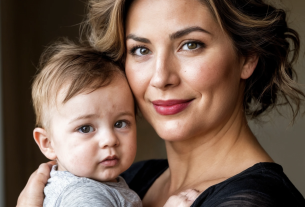— “Dim… Dima, please… go to the pharmacy.”
The voice was strange, dry and brittle, like last year’s leaves. Alina barely recognized it. It scraped her parched throat, and each word thudded through her head like a dull, red-hot blow. She lay there, pressed into a sweat-soaked pillow, staring at the ceiling that seemed to be slowly descending, threatening to crush her. Her body had turned into one continuous center of pain. Every joint, every bone felt like a mash of broken glass, and any movement—even the smallest, like turning her head—brought a fresh wave of torment. The fever wasn’t just a temperature; it was a living creature that had settled under her skin, poured lead into her muscles, and was now melting her from the inside.
From the living room came the rhythmic clack of keys and furious mouse clicks, punctuated by short, guttural shouts. That was Dima’s world. A world he dove into headfirst, putting on his huge pilot-helmet-like headphones. There, in virtual reality, battles raged, bases were captured, and digital blood flowed. There he was someone important. A commander. A hero. Here, in their small apartment, he was just a hunched silhouette in a gaming chair.
“Dim, do you hear me? I feel really bad. I need something for the fever and… something for my throat.”
She could see his back. Broad, strong shoulders, now tensed with the excitement of the game. He didn’t turn around. Only his left hand pulled away from the keyboard for a second and made a vague gesture in the air, which was supposed to mean, “I hear you, got it, now leave me alone.”
“Mm-hmm, in a sec…”
“Soon” never came. Time turned into a viscous, sticky mass. Minutes merged into hours. The sunlight seeping through the crack between the window and the frame gave way to gray dusk and then drowned in thick darkness. Alina slipped into a clammy, nightmarish sleep where hot waves and misshapen shadows pursued her, then surfaced back into reality—into pain, thirst, and the unending sounds of his battles. She dreamed of simple chicken broth. Not a delicacy, just the most basic food—a hot, salty liquid that could warm her from the inside and give her at least a drop of strength.
At some point, the sounds from the living room changed. The door intercom buzzed, a short exchange, rustling. And then a smell drifted through the apartment. Thick, spicy, murderously appetizing—the smell of hot dough, melted cheese, and pepperoni. Pizza. He’d ordered himself pizza. The thought didn’t make her angry—she didn’t have the strength for anger. It brought only a wave of dull, hopeless despair. He was there, ten meters away, eating, living, enjoying himself, and she was here, in their shared bedroom, slowly dissolving in fever, forgotten like something useless.
Mustering the last scraps of will, she called again, and this time her voice came out almost like a whimper.
“Dim… water, please… I’m thirsty.”
This time he reacted. He took off one earcup and turned his head. His face, lit by the bluish glow of the monitor, looked strange and unfamiliar. His eyes burned with excitement, a half-smile of anticipated victory froze on his lips. He looked at her but didn’t see her. His gaze slid over her as if she were just part of the furniture.
“I’ll finish this match. Almost the final.”
He put the headphone back on, and the wall of sound cut him off from her completely. Alina closed her eyes. “I’ll finish this match.” The phrase, tossed with mild irritation, was the last nail hammered into the coffin of her patience. She didn’t ask again. She just lay there, feeling a hot tear crawl down her cheek and evaporate instantly on her burning skin. She wasn’t just sick. She was alone. Absolutely, utterly alone in the same apartment with a man who once promised to be there in sorrow and in joy. Apparently, the flu with a temperature pushing forty didn’t fit into either category.
Time stopped existing. It dissolved into a chain of clammy, heavy dreams and short, agonizing awakenings. Alina didn’t know how long it had been—a day or an eternity. But at some indefinite moment she realized the fire inside her had gone out. The searing heat was replaced by a raw, exhausting weakness. The body that had been a blazing furnace now felt foreign and cold. The sheets under her were damp and clammy, and a vile taste of sickness filled her mouth.
Thirst. All-consuming. Not just the desire to drink, but a physical need, the cry of every cell in a dehydrated body. She slid her legs off the bed and the room immediately swayed, blurred, losing its outlines. Alina squeezed her eyes shut, gripping the edge of the mattress and riding out the wave of dizziness. The sounds from the living room hadn’t gone anywhere—they’d just changed their pitch. It wasn’t a furious shootout now, but the booming echo of some stream and Dima’s periodic comments addressed to invisible chat companions. He lived. His world kept turning.
The path to the kitchen became an ascent of Everest. Each step pounded in her temples. Holding on to the wall like a frail old woman, she moved forward slowly, unsteadily. The air in the hallway was stale, smelling sour and old. Leaving the bedroom’s half-light for the kitchen-living area, she was momentarily blinded by the daylight and froze, trying to focus her vision. And when she did, she saw.
It wasn’t just a mess. It was a monument to selfishness, erected in the two days she had spent in hell. On the coffee table stood a pyramid of three pizza boxes, blotched with congealed grease. Beside them—a heap of energy drink cans and a sticky ring from spilled cola. In the sink loomed a tower of dirty plates, mugs, and forks, drowning in cloudy, foul-smelling water. Crumbs and wrappers littered the floor. He hadn’t just failed to clean up after himself. He had methodically turned their shared home into his personal lair, a trash cave where the only clean and bright spot was the monitor screen.
Alina shifted her gaze to him. Dima sat with his back to her in the same chair, the same headphones. He hadn’t noticed her. He was there, in his world, where everything was simple and clear. Where there were no sick wives, no household problems, no responsibility.
She went to the fridge, opened it, and grabbed a bottle of mineral water. She took several large, convulsive gulps, feeling the life-giving liquid bring her back. At that moment, hearing the fridge door open, he turned. He took off his headphones, and lazy, indifferent curiosity crossed his face. He glanced over her—disheveled, pale, in a stale T-shirt—and a crooked smirk appeared on his lips.
“Oh, you’ve bounced back? Feeling like eating already.”
The words dropped into the ringing emptiness of her mind like a stone into a deep well. Not “How are you feeling?” Not “Do you need anything?” Just a simple, consumerist “bounced back,” as if she were a broken appliance that had finally been fixed and was ready to function again. And then came his need: “feeling like eating.” In that instant all her physical weakness evaporated, displaced by a wave of scalding, crystal-clear rage. She looked at him, at the mountains of trash around them, and for the first time in two days felt incredibly strong.
The universe, which had been rocking and swimming before her eyes, suddenly stilled, snapping into razor focus. The weakness that had fogged her mind burned away, incinerated by a white flame of fury. This wasn’t hysteria, not some petty tantrum. It was an explosion. A deep, tectonic shift that Dima, in his cozy little world of pixels and fast food, could never have anticipated.
“Feeling like eating, do you?” Alina’s voice broke—not from weakness, but from monstrous tension. It sounded like ice cracking. “Are you serious? I’ve been lying here for two days in my own sweat, barely able to stand to get to the bathroom! I asked you, begged you like some pitiful beggar, to go get me medicine! And you? You had to finish your match! My lips were sticking to my teeth from thirst while you gobbled your pizza, and the smell of it drifted into the bedroom! I was suffocating in there, and you didn’t even come to check on me!”
She didn’t scream; she spat out the words. Each one was a heavy, sharp stone she hurled at his impenetrable calm. The accusations were so specific, so irrefutable, there was no answering them with the standard “it’s your own fault” or “you’re exaggerating.”
Dima watched her outburst with lazy superiority. He leaned back in his chair, arms crossed, wearing the expression Alina hated more than anything— the condescending look of an adult listening to the babble of a misbehaving child. He waited. Waited for the flood of words to run dry, for her to tire herself out so he could put his headphones back on. He didn’t even try to grasp the essence of what she was saying. For him, it was just noise. Background.
At last, Alina fell silent. Not because she’d run out of words, but because she suddenly understood—this was pointless. Absolutely. It was like reciting poetry to a deaf wall. She looked at him, at his posture, at the little smirk tugging at his mouth, and all her fury instantly curled into an icy, heavy lump in her chest.
Dima waited a theatrical beat and said, with mocking solicitude:
“Feel better now that you got that off your chest?”
And that was his final mistake. He expected tears, reproaches, more scandal. He wasn’t prepared for what happened next.
Alina didn’t answer. She looked him in the eye for a few seconds, and there was no pain or hurt left in her gaze. Only the cold, detached resolve of a surgeon before a difficult operation. Then she turned away.
“I lay with a fever for two days, and you didn’t even make me tea! You’re not a husband—you’re a useless creature! From now on, whenever you feel like stuffing your face, you’ll cook for yourself!”
With that, she yanked the refrigerator door open. A puff of cold steamed out, wrapping her in mist. Dima watched her actions in bewilderment. What was she doing? Planning to eat by herself? Give him the silent treatment? The thoughts struck him as childish and ridiculous. But Alina didn’t take a plate. Her hands closed firmly around a large five-liter pot—the rich, dark-ruby borscht she’d made before she got sick. With effort she pulled it out and set it on the floor. Then her hand reached for the heavy container of golden pilaf, the rice infused with meat and spices. That went on the floor beside the borscht. Next came goulash, braised cabbage, chicken cutlets—everything she had methodically cooked so they would have food for several days.
Dima stared at the battery of pots and containers on the kitchen floor and still couldn’t grasp her intent. It didn’t fit any logical scheme in his head. A stupid, baffled look froze on his face. He opened his mouth to say something, but Alina, without looking at him, picked up the heaviest pot—the borscht—and walked with a firm, steady step toward the toilet.
The bathroom door stood open. The white porcelain toilet, usually associated with something mundane and utilitarian, now looked like a sacrificial altar. Alina stood over it holding the heavy pot. Her hands didn’t tremble. She leaned forward slightly, and a thick, ruby stream of borscht—chunks of meat and vegetables clearly visible—slapped into the water. The scent of beet, garlic, and rich stock—the smell of home, comfort, care—filled the small room, mixing with the harsh chlorine from the cleaner block.
Dima, frozen in the kitchen doorway, watched, his brain refusing to process what he was seeing. It was beyond his comprehension. Wrong. Absurd.
“What… what are you doing? Have you lost it?”
She didn’t dignify him with an answer. She watched the last piece of potato disappear into the whirlpool and pressed the flush button with mechanical precision. The roar of water, twisting into a furious vortex, was her only reply. The sound was deafening, final, like a period at the end of a very long sentence. Setting the empty pot on the tile, she turned silently and walked back to the kitchen.
Only now did the scale of what was happening begin to dawn on Dima. This wasn’t a momentary fit. It was methodical, cold annihilation.
“Are you crazy?!” he screamed as she picked up the container of pilaf. His voice rose to a shriek. “That’s food! Groceries! Do you even realize how much all that costs?!”
His scream wasn’t at her but at her hands, at the container, at the value it carried. He yelled about money, about labor, about senseless waste. He wasn’t yelling about her. Alina walked past him again as if he were empty space. The second portion of her care—fluffy, fragrant rice, tender pieces of meat—followed the borscht. The golden grains swirled in the water before disappearing into the dark maw of the drain. Another press of the button. Another deafening roar.
Dima’s rage peaked. He paced the kitchen, flailing his arms, his face flushed crimson.
“What’s wrong with you?! Just take everything and pour it out! All the food! What am I supposed to eat now, huh?! You cooked it, and now you dump it down the toilet! This isn’t normal!”
But his words no longer had any weight for her. They were just noise, background to her actions. She moved with the steady rhythm of an assembly-line machine. Goulash. Cutlets. Braised cabbage. Each trip from the kitchen to the bathroom carried her farther and farther from him, from their old life. She didn’t look at him or react to his yelling. She simply did what she had decided to do—destroy every bridge, every thread, every tangible embodiment of her care that he had grown so used to consuming while giving nothing in return.
When the last pot was empty, she returned to the kitchen. A whole battery of dishes reeking of food remnants stood on the floor. Dima was breathing hard, leaning against the wall, scorching her with his glare. He waited. For explanations, for more fighting, for anything.
Alina surveyed the battlefield. Then she calmly opened the fridge once more. In the very corner stood a small plastic container she hadn’t touched. She took it. Inside were a couple of chicken cutlets and some buckwheat. Her portion. Her dinner. With that container in one hand and a fork—taken from the drawer with clean utensils—in the other, she headed for the bedroom.
“And that’s it?!” he rasped at her back. “You’re just going to walk away?! What am I supposed to do now, with all this?!”
She stopped at the bedroom door but didn’t turn. For just a second he thought she might say something. But she silently stepped inside. And then he heard a sound louder and more terrifying than all his shouting.
Click.
The dry, metallic click of a key turning in the lock.
Dima was left alone. Alone in the middle of the wrecked kitchen, piled with empty boxes and dirty dishes. Alone, with an empty fridge and a hollow, gnawing hunger. No sound came from behind the locked bedroom door. There, in her own world, separated by a thin slab of wood and a small piece of metal in the keyhole, Alina ate in peace, putting on some movie. She was getting better.



